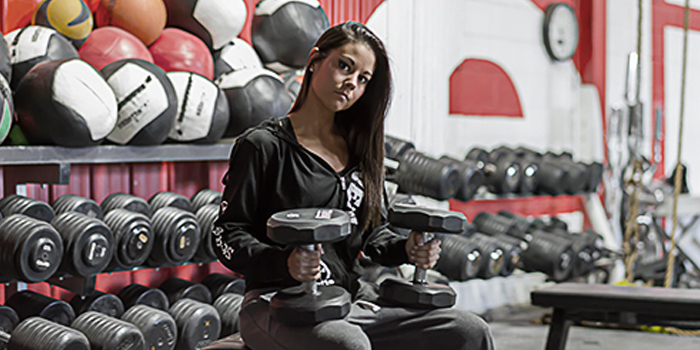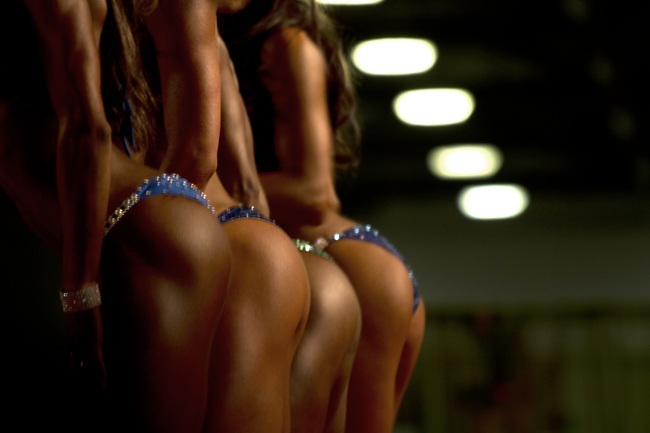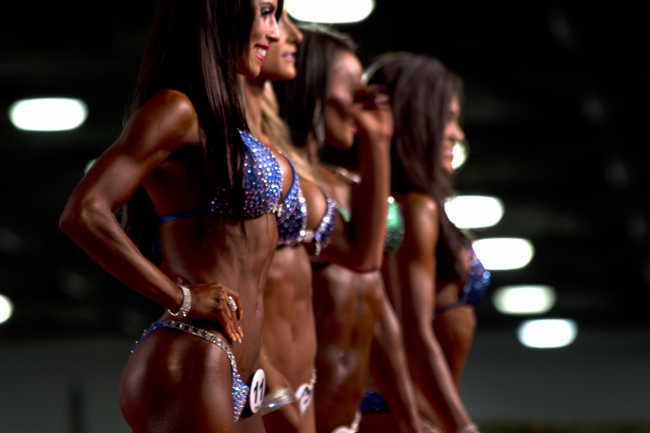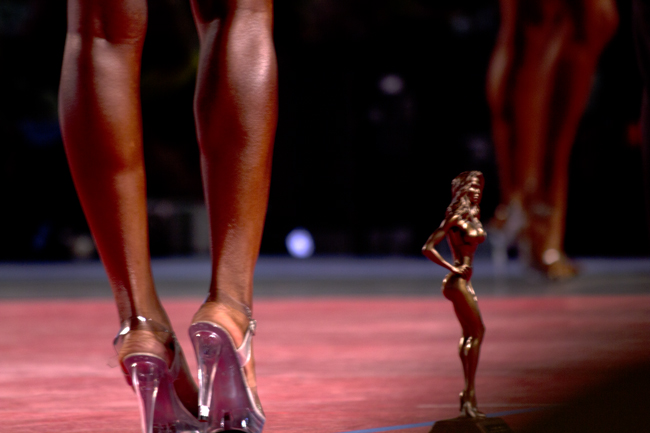
It’s here! Show day is finally here. The day that you've been waiting for has finally arrived and you're excited, nervous, hungry, tired, anxious, freaking out and all the above, especially if it's your first show. How you approach this entire day mentally and preparation wise will make or break your experience. In this final installment of the contest prep survival guide (see parts one and two if you haven’t read those already), I'll go over the final pieces of contest prep and what to expect on the day of the contest.
Plan to Prepare or Prepare to Fail
There are many steps and processes that need to take place before your show. Make a list and check it twice! Below are some key items to remember.
1. Register for the show: This may seem obvious…but I suggest registering for your show months in advance. Yes, months. This holds you accountable to actually train properly and it gets it out of the way so that you don’t have to worry about it.
2. Review the federation regulations and updates: Once you register, you'll begin to receive emails and letters with information regarding the show structure, tanning, rules and regulations. You need to read these thoroughly. For example, the NPC recently made a change to their check-in procedure. Now, every competitor must check-in for the show the night before. This is typically done at the host hotel for most competitions. They used to allow competitors to check in the morning of the show at the venue, which is what I always used to do. Glad I read that email or else I would've been jacked and tan and out of the show. Epic failure averted.
3. Get your federation card: You also need to obtain your federation card. Most shows allow you to purchase your card during check-in, but you can also preorder it. I’ve always purchased mine at the show and never had a problem. I was always afraid that I would preorder it and it wouldn’t arrive on time or something. Yikes!
4. Tanning: The show itself will provide professional tanning services at the host hotel and/or venue for all competitors. I highly suggest signing up for your tanning about 6–8 weeks in advance to play it safe. Scheduling your tanning time is also important. I suggest scheduling at least your first coat as early as possible the day before the show. This will give you plenty of time to dry overnight so that you don’t have that pasty look and feel like a stick of glue. Your coat(s) on show day will also look better if your first coat is dry enough. You can buy tanner yourself and apply it, which is a cheaper option, but there is a much larger risk of screwing it up. After doing that myself my first few shows, I personally would rather pay more for peace of mind and stick with the professionals.
5. Hair and Make up: Along with tanning, most shows provide hair and make up services at an additional cost (sometimes free.) I personally have never had my hair or make-up done professionally for my shows. I am blessed to have a sister who is The Bomb Dot Com at make up application and that my hair looks best poker straight. If you do not have experience putting on show make-up or know someone who does, I would suggest having it done professionally to see how it is done, at least for your first show. Your make-up needs to be a little more dramatic than normal since you will be on stage under bright lights, but you also should not look like a drag queen. I’ve always brought my make-up with me to the show for touch ups just in case, but you should have your make-up 100% done first thing the morning. As for hair, I personally think keeping it simple is best. Most competitors wear their hair down and just style it. I definitely would not go crazy with the curls, keep it simple and relaxed.
Lastly, I would suggest practicing your hair and make-up a few times before the show. Maybe before going out to dinner with your friends or bae, just dazzle it up a bit to see how it looks and how long it takes to do. Remember, everything from you make up, hair, suit, jewelry, and physique should all flow together and make sense. You are judged on your overall package so these details cannot be overlooked.
Almost There...Peak Week
As a competitor, even if you're new to the world of competing, you've heard of the mystical powers that lie within the infamous peak week. This is the week prior to the show and is purposefully designed to bring your best package to the stage. Your nutrition and training may start to change and everything should fall into place so that you may step on stage at your best.
The point I want to share about peak week specifically is that as a new competitor, don't expect a drastic transformation within that timeframe. I see many competitors rely too heavily on their peak week and slack throughout the majority of their prep. Peak week is the time to take a solid package and refine it so that you can jump on stage and look top notch. It isn't the time to be cramming in extra workouts and starving yourself because you realize, "Crap! I'll be on stage in a week!”
If you have a coach, he or she should design your peak week according to your needs and where you're at, but it definitely isn't the time to play catch up. Keep that in mind. If you push hard and follow your plan through your prep, peak week will be a fun and exciting experience. One final note—if your coach tells you to pull all water and sodium from your diet days during peak week or even on show day, please use common sense and simply say, "No." A competition isn't worth you passing out backstage because drastic measures were taken that were absolutely unnecessary. Thereafter, look for a different coach. At the end of the day, or week in this matter, peak week should be a positive experience if done correctly.
Time to Jump on Stage!
1. Realistic expectations: Have a realistic mindset and overall goal for the show, especially if this is your first show. You really have nothing to compare yourself to. Competing is you versus you every single time. Yes, you compete against others, but the only thing that you can do when you prepare for shows is to look better than you previously did.
For your first show, you don't have a comparison. You need to look at your first show as the beginning, not the end. Go out there and do the best that you can. Either way, it’s a win-win situation. There is literally no pressure to beat anyone or place a certain way. Yes, we all hope to win every show that we ever compete in, but it just doesn’t work like that. Go into the show with realistic expectations and do the best you can in your given situation.
2. Things may inevitability go wrong on show day: My worst fear on show day is falling in my heels walking on stage. Luckily, that has never happened to me, but I've definitely seen it happen a time or two. I was so scared of falling in my first show that I glued (bikini bite…not real glue) my feet into my heels. It definitely worked, but it might have been a little overkill.
In case of mishaps, I would bring the following with you to make sure that you're prepared:
- Bikini Bite (yes, for guys too…no one wants to see your weenie)
- Extra food in case your class goes on stage late
- Plenty of water and PowerAde zeros
- Safety pins in case your suit breaks or rips
- Hair brush, spray, straightener
- Extra make-up, brushes, fake eye lashes, glue for touch ups
- Extra gloves if you need to touch up your own tanner
- Resistance bands to pump up backstage (not every show provides weights or bands, so bring your own)
- Cash (some shows only accept cash, so in case you need an extra coat of tanner or need to buy your federation card on-site, bring some cash)
- Family and friends to support you and cheer when you go on stage (it will help take the edge off)
So the Show Is Over…Now What?
No matter how you placed or how great you looked and/or felt, the aftermath of a show is an interesting one. Weeks leading up to the show involves a lot of excitement. The attention is solely on you. Friends, family and other competitors are always asking about your prep and complimenting how you look all day every day. After a show, there seems to be this weird anti-climactic feeling within a competitor when the eyes aren't all on them. Some competitors get anxious and start looking for other shows to do to stay in the game, and some even get depressed after all the hype. You must be aware that the aftermath of a show is probably more important than the weeks leading up to the show itself.
After a show, you must control your eating habits and your attitude. Competing is great, but it shouldn't consume your overall being and purpose of life. If it does, you'll either be depressed that it’s over and eat your feelings or continuously compete to fill that void. Neither are healthy or conducive to competing long term and enjoying the sport.
After your competition season, you must keep in mind your overall goal in a positive way and keep yourself accountable to what is best for you in the long run. If you want to compete again, you need to keep your nutrition in check and training on point to see progress. A healthy and strong off-season builds a champion.
I really hope that this article series shed some light on the sport and what it truly takes to compete. Passion, hard work, money and time are just a few aspects of what this sport entails. I truly believe that with the right mindset, bodybuilding can be a great sport for women and men. It builds nutrition and exercise education and overall confidence in yourself to excel in and out of the sport. If done correctly, it can be the best thing that you've ever done.
Contest Prep Survival Guide: Getting Started
Contest Prep Survival Guide: Food Preparation and Traveling Tips













